Analysis of the Consumer Rights Act 2015 in Business Law Context
VerifiedAdded on 2023/01/13
|8
|2773
|54
Report
AI Summary
This report provides a comprehensive overview of the Consumer Rights Act 2015, examining its key provisions and implications for businesses and consumers. It delves into the concept of implied terms, explaining their significance in contractual agreements and the legal rules governing them. The report analyzes statutory provisions within the Act, highlighting the rights and responsibilities of both buyers and sellers, and the remedies available in case of breaches of contract. It explores product liability, detailing the circumstances under which manufacturers or sellers can be held accountable for defective products and the resulting damages. The report uses a case study involving a consumer and a departmental store to illustrate the practical application of the Act's principles, referencing relevant case law such as BSS group Plc V Makers (UK) Ltd and Hochster v De la Tour to support its arguments. The report concludes by emphasizing the importance of the Consumer Rights Act in protecting consumer rights and ensuring fair business practices.
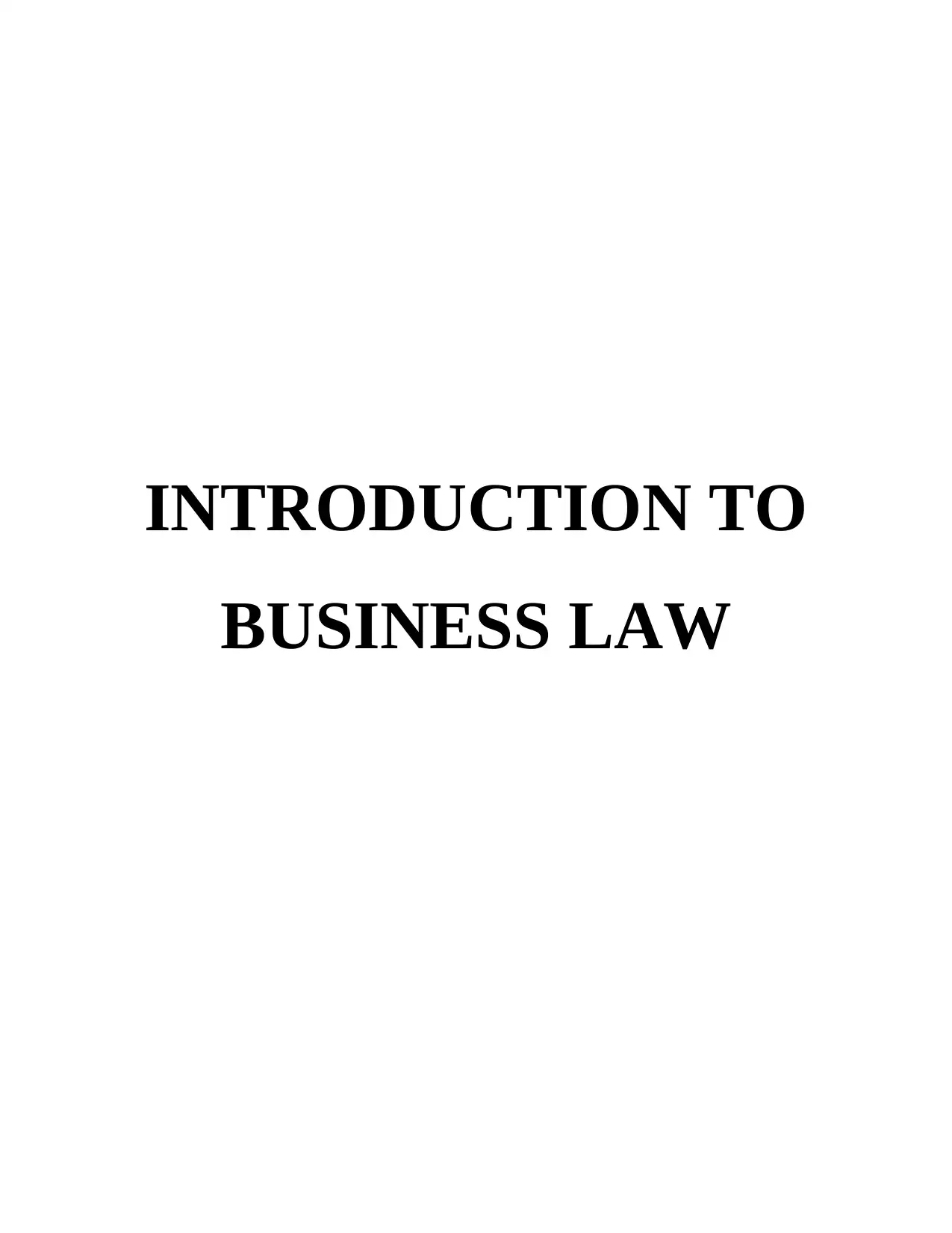
INTRODUCTION TO
BUSINESS LAW
BUSINESS LAW
Paraphrase This Document
Need a fresh take? Get an instant paraphrase of this document with our AI Paraphraser
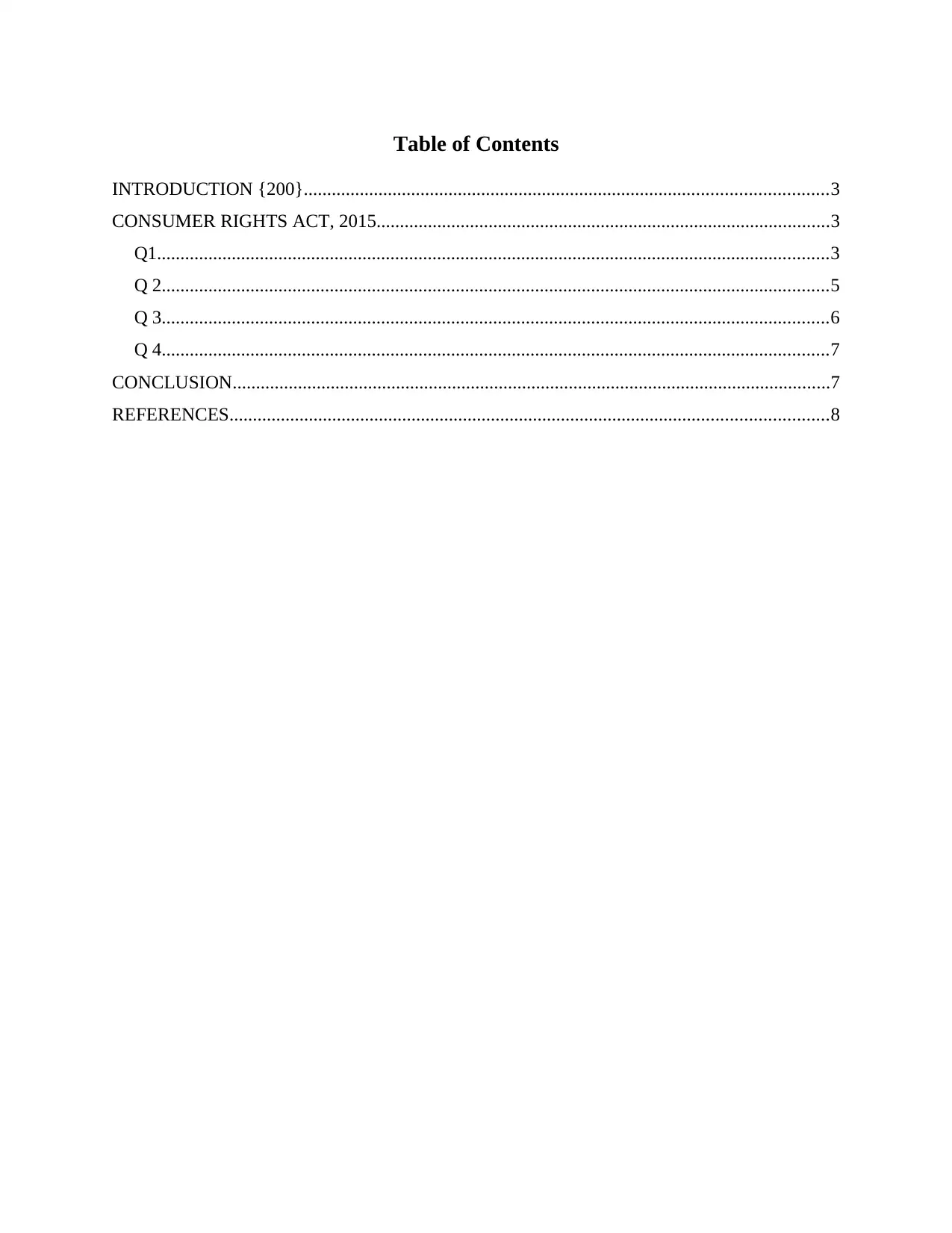
Table of Contents
INTRODUCTION {200}................................................................................................................3
CONSUMER RIGHTS ACT, 2015.................................................................................................3
Q1................................................................................................................................................3
Q 2...............................................................................................................................................5
Q 3...............................................................................................................................................6
Q 4...............................................................................................................................................7
CONCLUSION................................................................................................................................7
REFERENCES................................................................................................................................8
INTRODUCTION {200}................................................................................................................3
CONSUMER RIGHTS ACT, 2015.................................................................................................3
Q1................................................................................................................................................3
Q 2...............................................................................................................................................5
Q 3...............................................................................................................................................6
Q 4...............................................................................................................................................7
CONCLUSION................................................................................................................................7
REFERENCES................................................................................................................................8
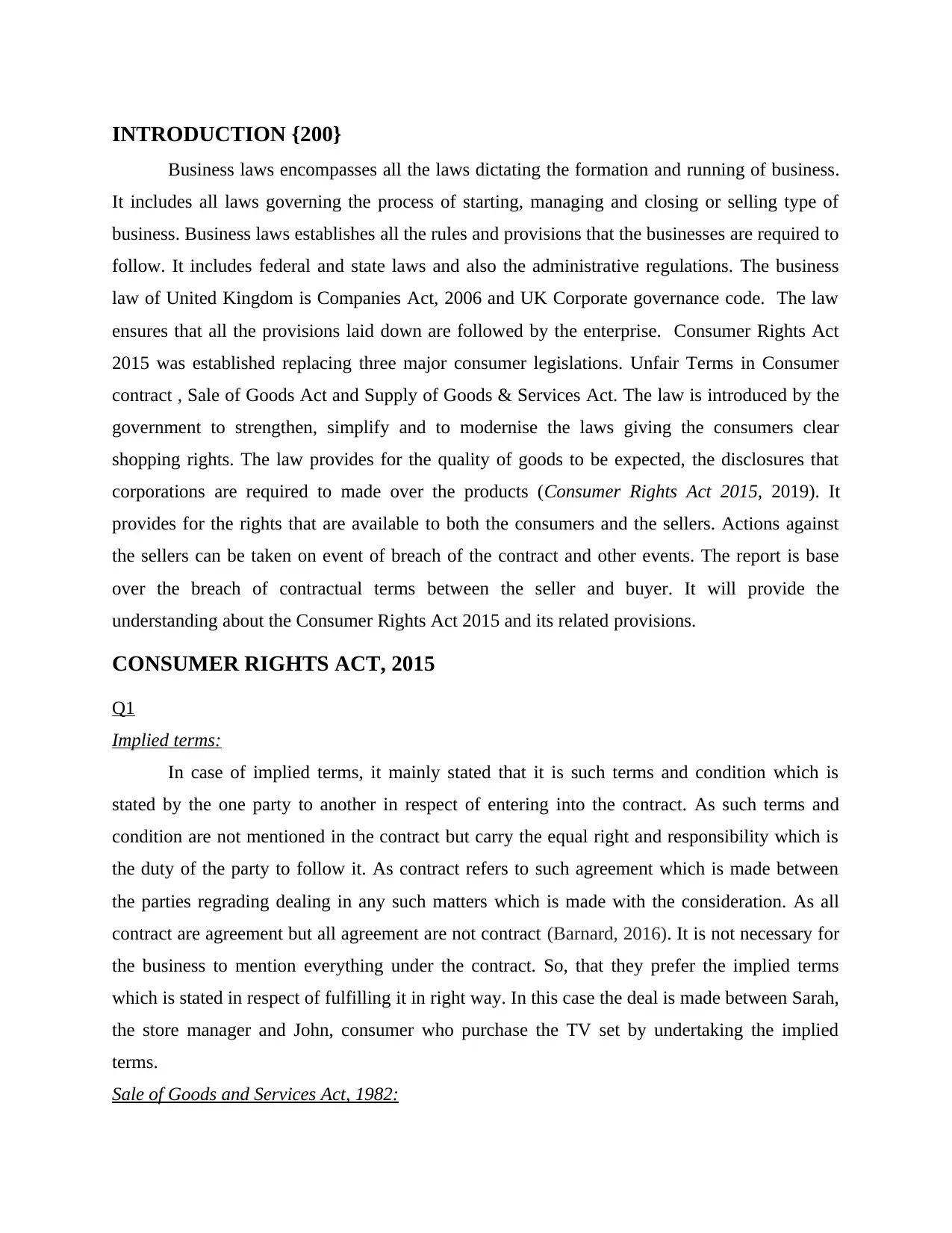
INTRODUCTION {200}
Business laws encompasses all the laws dictating the formation and running of business.
It includes all laws governing the process of starting, managing and closing or selling type of
business. Business laws establishes all the rules and provisions that the businesses are required to
follow. It includes federal and state laws and also the administrative regulations. The business
law of United Kingdom is Companies Act, 2006 and UK Corporate governance code. The law
ensures that all the provisions laid down are followed by the enterprise. Consumer Rights Act
2015 was established replacing three major consumer legislations. Unfair Terms in Consumer
contract , Sale of Goods Act and Supply of Goods & Services Act. The law is introduced by the
government to strengthen, simplify and to modernise the laws giving the consumers clear
shopping rights. The law provides for the quality of goods to be expected, the disclosures that
corporations are required to made over the products (Consumer Rights Act 2015, 2019). It
provides for the rights that are available to both the consumers and the sellers. Actions against
the sellers can be taken on event of breach of the contract and other events. The report is base
over the breach of contractual terms between the seller and buyer. It will provide the
understanding about the Consumer Rights Act 2015 and its related provisions.
CONSUMER RIGHTS ACT, 2015
Q1
Implied terms:
In case of implied terms, it mainly stated that it is such terms and condition which is
stated by the one party to another in respect of entering into the contract. As such terms and
condition are not mentioned in the contract but carry the equal right and responsibility which is
the duty of the party to follow it. As contract refers to such agreement which is made between
the parties regrading dealing in any such matters which is made with the consideration. As all
contract are agreement but all agreement are not contract (Barnard, 2016). It is not necessary for
the business to mention everything under the contract. So, that they prefer the implied terms
which is stated in respect of fulfilling it in right way. In this case the deal is made between Sarah,
the store manager and John, consumer who purchase the TV set by undertaking the implied
terms.
Sale of Goods and Services Act, 1982:
Business laws encompasses all the laws dictating the formation and running of business.
It includes all laws governing the process of starting, managing and closing or selling type of
business. Business laws establishes all the rules and provisions that the businesses are required to
follow. It includes federal and state laws and also the administrative regulations. The business
law of United Kingdom is Companies Act, 2006 and UK Corporate governance code. The law
ensures that all the provisions laid down are followed by the enterprise. Consumer Rights Act
2015 was established replacing three major consumer legislations. Unfair Terms in Consumer
contract , Sale of Goods Act and Supply of Goods & Services Act. The law is introduced by the
government to strengthen, simplify and to modernise the laws giving the consumers clear
shopping rights. The law provides for the quality of goods to be expected, the disclosures that
corporations are required to made over the products (Consumer Rights Act 2015, 2019). It
provides for the rights that are available to both the consumers and the sellers. Actions against
the sellers can be taken on event of breach of the contract and other events. The report is base
over the breach of contractual terms between the seller and buyer. It will provide the
understanding about the Consumer Rights Act 2015 and its related provisions.
CONSUMER RIGHTS ACT, 2015
Q1
Implied terms:
In case of implied terms, it mainly stated that it is such terms and condition which is
stated by the one party to another in respect of entering into the contract. As such terms and
condition are not mentioned in the contract but carry the equal right and responsibility which is
the duty of the party to follow it. As contract refers to such agreement which is made between
the parties regrading dealing in any such matters which is made with the consideration. As all
contract are agreement but all agreement are not contract (Barnard, 2016). It is not necessary for
the business to mention everything under the contract. So, that they prefer the implied terms
which is stated in respect of fulfilling it in right way. In this case the deal is made between Sarah,
the store manager and John, consumer who purchase the TV set by undertaking the implied
terms.
Sale of Goods and Services Act, 1982:
⊘ This is a preview!⊘
Do you want full access?
Subscribe today to unlock all pages.

Trusted by 1+ million students worldwide
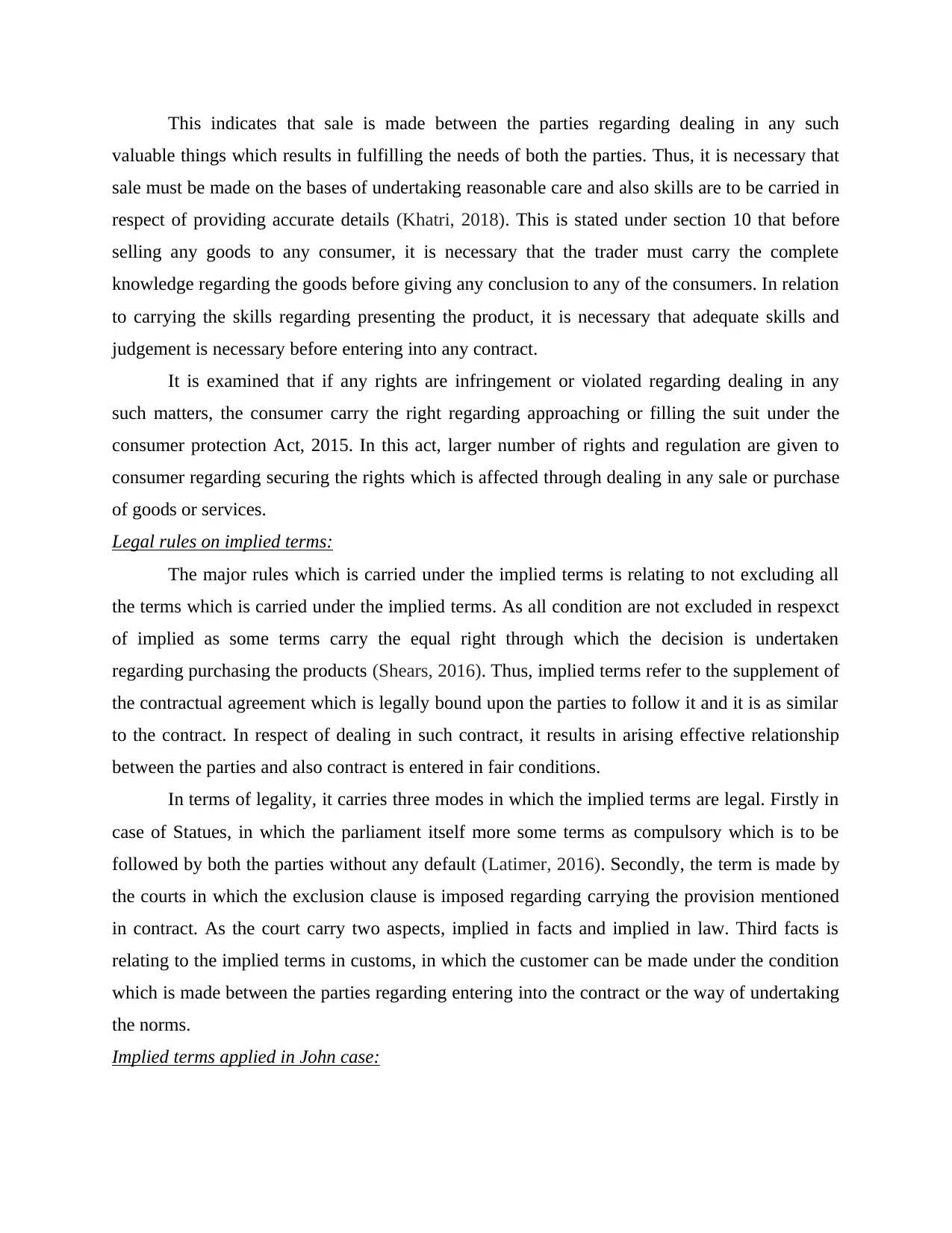
This indicates that sale is made between the parties regarding dealing in any such
valuable things which results in fulfilling the needs of both the parties. Thus, it is necessary that
sale must be made on the bases of undertaking reasonable care and also skills are to be carried in
respect of providing accurate details (Khatri, 2018). This is stated under section 10 that before
selling any goods to any consumer, it is necessary that the trader must carry the complete
knowledge regarding the goods before giving any conclusion to any of the consumers. In relation
to carrying the skills regarding presenting the product, it is necessary that adequate skills and
judgement is necessary before entering into any contract.
It is examined that if any rights are infringement or violated regarding dealing in any
such matters, the consumer carry the right regarding approaching or filling the suit under the
consumer protection Act, 2015. In this act, larger number of rights and regulation are given to
consumer regarding securing the rights which is affected through dealing in any sale or purchase
of goods or services.
Legal rules on implied terms:
The major rules which is carried under the implied terms is relating to not excluding all
the terms which is carried under the implied terms. As all condition are not excluded in respexct
of implied as some terms carry the equal right through which the decision is undertaken
regarding purchasing the products (Shears, 2016). Thus, implied terms refer to the supplement of
the contractual agreement which is legally bound upon the parties to follow it and it is as similar
to the contract. In respect of dealing in such contract, it results in arising effective relationship
between the parties and also contract is entered in fair conditions.
In terms of legality, it carries three modes in which the implied terms are legal. Firstly in
case of Statues, in which the parliament itself more some terms as compulsory which is to be
followed by both the parties without any default (Latimer, 2016). Secondly, the term is made by
the courts in which the exclusion clause is imposed regarding carrying the provision mentioned
in contract. As the court carry two aspects, implied in facts and implied in law. Third facts is
relating to the implied terms in customs, in which the customer can be made under the condition
which is made between the parties regarding entering into the contract or the way of undertaking
the norms.
Implied terms applied in John case:
valuable things which results in fulfilling the needs of both the parties. Thus, it is necessary that
sale must be made on the bases of undertaking reasonable care and also skills are to be carried in
respect of providing accurate details (Khatri, 2018). This is stated under section 10 that before
selling any goods to any consumer, it is necessary that the trader must carry the complete
knowledge regarding the goods before giving any conclusion to any of the consumers. In relation
to carrying the skills regarding presenting the product, it is necessary that adequate skills and
judgement is necessary before entering into any contract.
It is examined that if any rights are infringement or violated regarding dealing in any
such matters, the consumer carry the right regarding approaching or filling the suit under the
consumer protection Act, 2015. In this act, larger number of rights and regulation are given to
consumer regarding securing the rights which is affected through dealing in any sale or purchase
of goods or services.
Legal rules on implied terms:
The major rules which is carried under the implied terms is relating to not excluding all
the terms which is carried under the implied terms. As all condition are not excluded in respexct
of implied as some terms carry the equal right through which the decision is undertaken
regarding purchasing the products (Shears, 2016). Thus, implied terms refer to the supplement of
the contractual agreement which is legally bound upon the parties to follow it and it is as similar
to the contract. In respect of dealing in such contract, it results in arising effective relationship
between the parties and also contract is entered in fair conditions.
In terms of legality, it carries three modes in which the implied terms are legal. Firstly in
case of Statues, in which the parliament itself more some terms as compulsory which is to be
followed by both the parties without any default (Latimer, 2016). Secondly, the term is made by
the courts in which the exclusion clause is imposed regarding carrying the provision mentioned
in contract. As the court carry two aspects, implied in facts and implied in law. Third facts is
relating to the implied terms in customs, in which the customer can be made under the condition
which is made between the parties regarding entering into the contract or the way of undertaking
the norms.
Implied terms applied in John case:
Paraphrase This Document
Need a fresh take? Get an instant paraphrase of this document with our AI Paraphraser
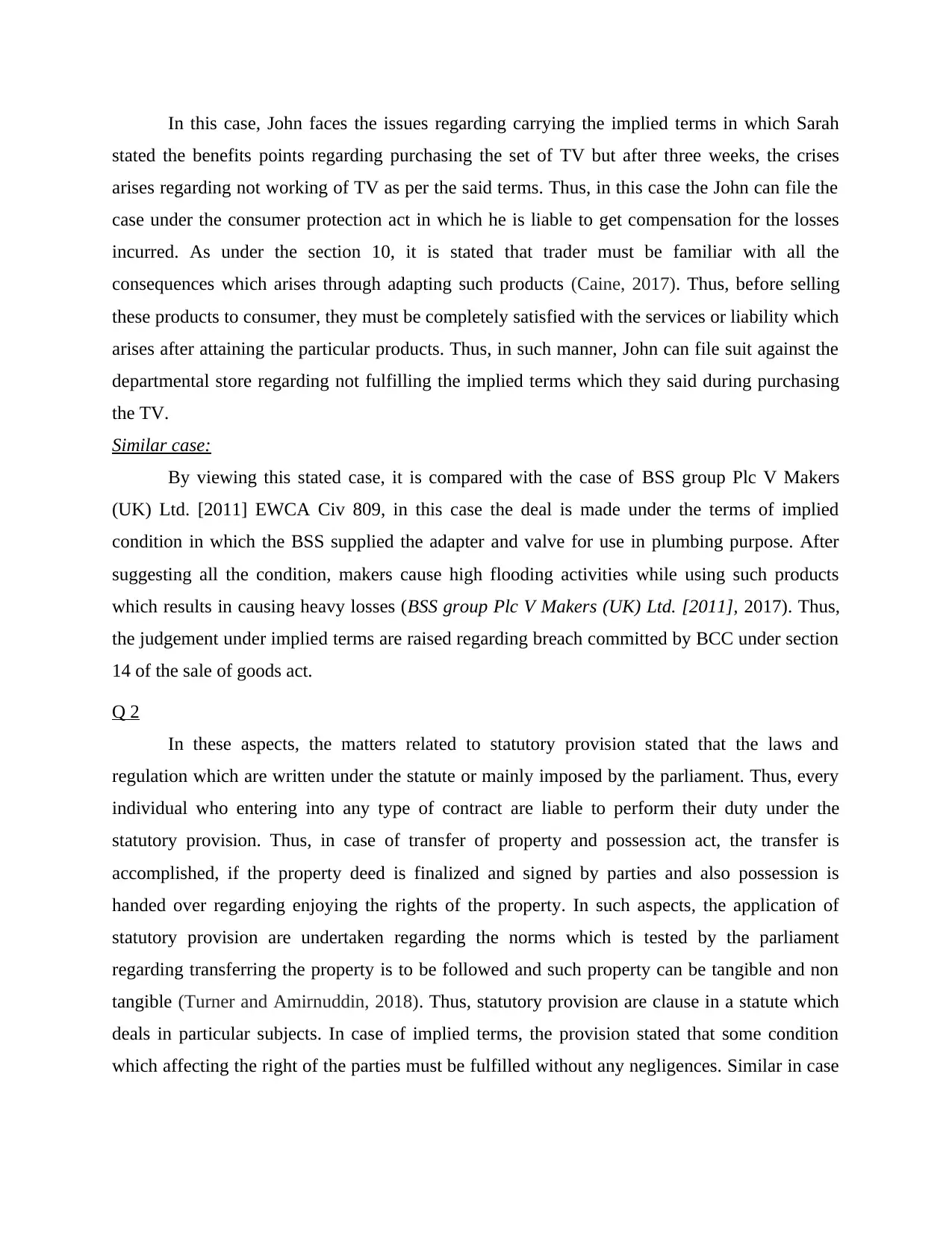
In this case, John faces the issues regarding carrying the implied terms in which Sarah
stated the benefits points regarding purchasing the set of TV but after three weeks, the crises
arises regarding not working of TV as per the said terms. Thus, in this case the John can file the
case under the consumer protection act in which he is liable to get compensation for the losses
incurred. As under the section 10, it is stated that trader must be familiar with all the
consequences which arises through adapting such products (Caine, 2017). Thus, before selling
these products to consumer, they must be completely satisfied with the services or liability which
arises after attaining the particular products. Thus, in such manner, John can file suit against the
departmental store regarding not fulfilling the implied terms which they said during purchasing
the TV.
Similar case:
By viewing this stated case, it is compared with the case of BSS group Plc V Makers
(UK) Ltd. [2011] EWCA Civ 809, in this case the deal is made under the terms of implied
condition in which the BSS supplied the adapter and valve for use in plumbing purpose. After
suggesting all the condition, makers cause high flooding activities while using such products
which results in causing heavy losses (BSS group Plc V Makers (UK) Ltd. [2011], 2017). Thus,
the judgement under implied terms are raised regarding breach committed by BCC under section
14 of the sale of goods act.
Q 2
In these aspects, the matters related to statutory provision stated that the laws and
regulation which are written under the statute or mainly imposed by the parliament. Thus, every
individual who entering into any type of contract are liable to perform their duty under the
statutory provision. Thus, in case of transfer of property and possession act, the transfer is
accomplished, if the property deed is finalized and signed by parties and also possession is
handed over regarding enjoying the rights of the property. In such aspects, the application of
statutory provision are undertaken regarding the norms which is tested by the parliament
regarding transferring the property is to be followed and such property can be tangible and non
tangible (Turner and Amirnuddin, 2018). Thus, statutory provision are clause in a statute which
deals in particular subjects. In case of implied terms, the provision stated that some condition
which affecting the right of the parties must be fulfilled without any negligences. Similar in case
stated the benefits points regarding purchasing the set of TV but after three weeks, the crises
arises regarding not working of TV as per the said terms. Thus, in this case the John can file the
case under the consumer protection act in which he is liable to get compensation for the losses
incurred. As under the section 10, it is stated that trader must be familiar with all the
consequences which arises through adapting such products (Caine, 2017). Thus, before selling
these products to consumer, they must be completely satisfied with the services or liability which
arises after attaining the particular products. Thus, in such manner, John can file suit against the
departmental store regarding not fulfilling the implied terms which they said during purchasing
the TV.
Similar case:
By viewing this stated case, it is compared with the case of BSS group Plc V Makers
(UK) Ltd. [2011] EWCA Civ 809, in this case the deal is made under the terms of implied
condition in which the BSS supplied the adapter and valve for use in plumbing purpose. After
suggesting all the condition, makers cause high flooding activities while using such products
which results in causing heavy losses (BSS group Plc V Makers (UK) Ltd. [2011], 2017). Thus,
the judgement under implied terms are raised regarding breach committed by BCC under section
14 of the sale of goods act.
Q 2
In these aspects, the matters related to statutory provision stated that the laws and
regulation which are written under the statute or mainly imposed by the parliament. Thus, every
individual who entering into any type of contract are liable to perform their duty under the
statutory provision. Thus, in case of transfer of property and possession act, the transfer is
accomplished, if the property deed is finalized and signed by parties and also possession is
handed over regarding enjoying the rights of the property. In such aspects, the application of
statutory provision are undertaken regarding the norms which is tested by the parliament
regarding transferring the property is to be followed and such property can be tangible and non
tangible (Turner and Amirnuddin, 2018). Thus, statutory provision are clause in a statute which
deals in particular subjects. In case of implied terms, the provision stated that some condition
which affecting the right of the parties must be fulfilled without any negligences. Similar in case
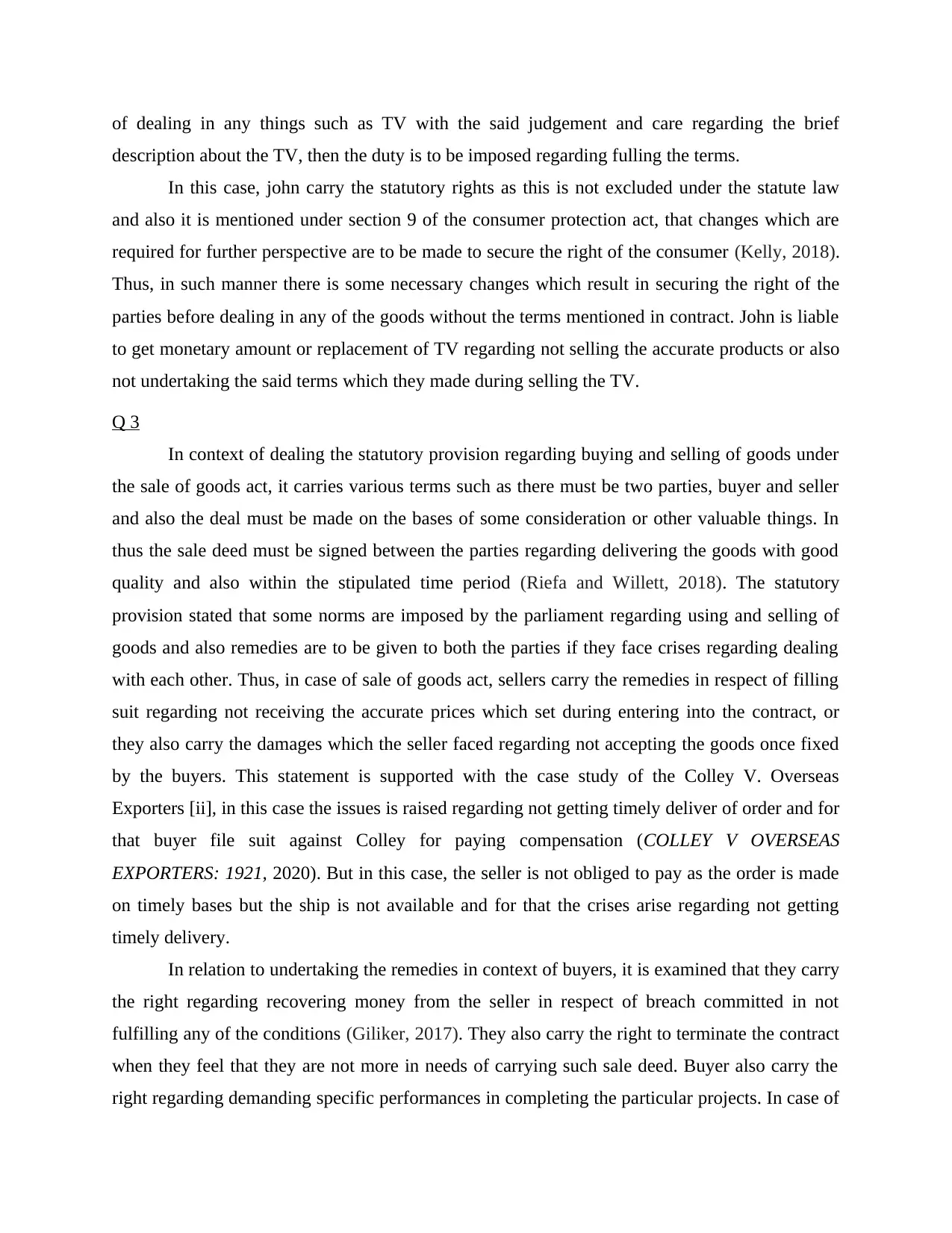
of dealing in any things such as TV with the said judgement and care regarding the brief
description about the TV, then the duty is to be imposed regarding fulling the terms.
In this case, john carry the statutory rights as this is not excluded under the statute law
and also it is mentioned under section 9 of the consumer protection act, that changes which are
required for further perspective are to be made to secure the right of the consumer (Kelly, 2018).
Thus, in such manner there is some necessary changes which result in securing the right of the
parties before dealing in any of the goods without the terms mentioned in contract. John is liable
to get monetary amount or replacement of TV regarding not selling the accurate products or also
not undertaking the said terms which they made during selling the TV.
Q 3
In context of dealing the statutory provision regarding buying and selling of goods under
the sale of goods act, it carries various terms such as there must be two parties, buyer and seller
and also the deal must be made on the bases of some consideration or other valuable things. In
thus the sale deed must be signed between the parties regarding delivering the goods with good
quality and also within the stipulated time period (Riefa and Willett, 2018). The statutory
provision stated that some norms are imposed by the parliament regarding using and selling of
goods and also remedies are to be given to both the parties if they face crises regarding dealing
with each other. Thus, in case of sale of goods act, sellers carry the remedies in respect of filling
suit regarding not receiving the accurate prices which set during entering into the contract, or
they also carry the damages which the seller faced regarding not accepting the goods once fixed
by the buyers. This statement is supported with the case study of the Colley V. Overseas
Exporters [ii], in this case the issues is raised regarding not getting timely deliver of order and for
that buyer file suit against Colley for paying compensation (COLLEY V OVERSEAS
EXPORTERS: 1921, 2020). But in this case, the seller is not obliged to pay as the order is made
on timely bases but the ship is not available and for that the crises arise regarding not getting
timely delivery.
In relation to undertaking the remedies in context of buyers, it is examined that they carry
the right regarding recovering money from the seller in respect of breach committed in not
fulfilling any of the conditions (Giliker, 2017). They also carry the right to terminate the contract
when they feel that they are not more in needs of carrying such sale deed. Buyer also carry the
right regarding demanding specific performances in completing the particular projects. In case of
description about the TV, then the duty is to be imposed regarding fulling the terms.
In this case, john carry the statutory rights as this is not excluded under the statute law
and also it is mentioned under section 9 of the consumer protection act, that changes which are
required for further perspective are to be made to secure the right of the consumer (Kelly, 2018).
Thus, in such manner there is some necessary changes which result in securing the right of the
parties before dealing in any of the goods without the terms mentioned in contract. John is liable
to get monetary amount or replacement of TV regarding not selling the accurate products or also
not undertaking the said terms which they made during selling the TV.
Q 3
In context of dealing the statutory provision regarding buying and selling of goods under
the sale of goods act, it carries various terms such as there must be two parties, buyer and seller
and also the deal must be made on the bases of some consideration or other valuable things. In
thus the sale deed must be signed between the parties regarding delivering the goods with good
quality and also within the stipulated time period (Riefa and Willett, 2018). The statutory
provision stated that some norms are imposed by the parliament regarding using and selling of
goods and also remedies are to be given to both the parties if they face crises regarding dealing
with each other. Thus, in case of sale of goods act, sellers carry the remedies in respect of filling
suit regarding not receiving the accurate prices which set during entering into the contract, or
they also carry the damages which the seller faced regarding not accepting the goods once fixed
by the buyers. This statement is supported with the case study of the Colley V. Overseas
Exporters [ii], in this case the issues is raised regarding not getting timely deliver of order and for
that buyer file suit against Colley for paying compensation (COLLEY V OVERSEAS
EXPORTERS: 1921, 2020). But in this case, the seller is not obliged to pay as the order is made
on timely bases but the ship is not available and for that the crises arise regarding not getting
timely delivery.
In relation to undertaking the remedies in context of buyers, it is examined that they carry
the right regarding recovering money from the seller in respect of breach committed in not
fulfilling any of the conditions (Giliker, 2017). They also carry the right to terminate the contract
when they feel that they are not more in needs of carrying such sale deed. Buyer also carry the
right regarding demanding specific performances in completing the particular projects. In case of
⊘ This is a preview!⊘
Do you want full access?
Subscribe today to unlock all pages.

Trusted by 1+ million students worldwide
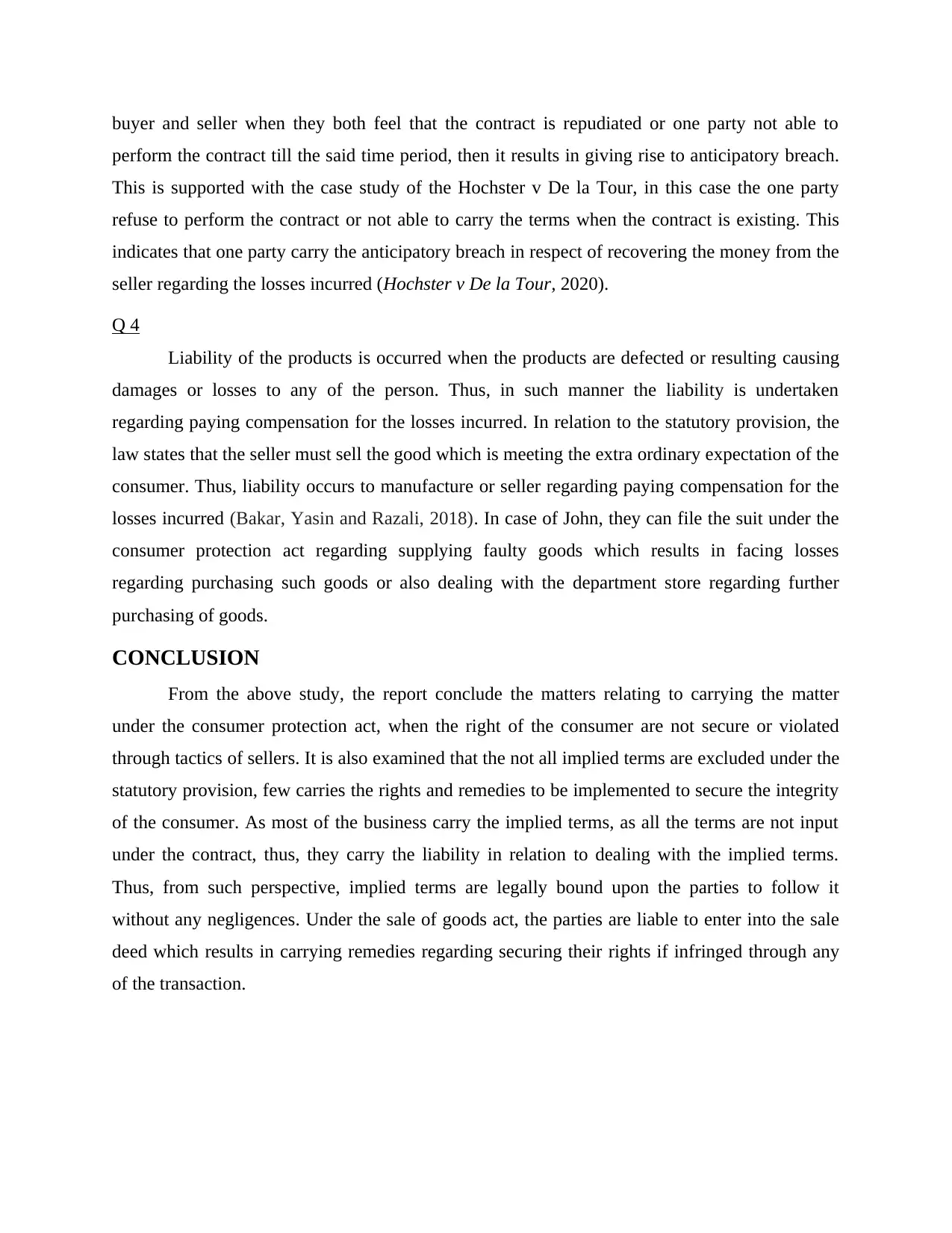
buyer and seller when they both feel that the contract is repudiated or one party not able to
perform the contract till the said time period, then it results in giving rise to anticipatory breach.
This is supported with the case study of the Hochster v De la Tour, in this case the one party
refuse to perform the contract or not able to carry the terms when the contract is existing. This
indicates that one party carry the anticipatory breach in respect of recovering the money from the
seller regarding the losses incurred (Hochster v De la Tour, 2020).
Q 4
Liability of the products is occurred when the products are defected or resulting causing
damages or losses to any of the person. Thus, in such manner the liability is undertaken
regarding paying compensation for the losses incurred. In relation to the statutory provision, the
law states that the seller must sell the good which is meeting the extra ordinary expectation of the
consumer. Thus, liability occurs to manufacture or seller regarding paying compensation for the
losses incurred (Bakar, Yasin and Razali, 2018). In case of John, they can file the suit under the
consumer protection act regarding supplying faulty goods which results in facing losses
regarding purchasing such goods or also dealing with the department store regarding further
purchasing of goods.
CONCLUSION
From the above study, the report conclude the matters relating to carrying the matter
under the consumer protection act, when the right of the consumer are not secure or violated
through tactics of sellers. It is also examined that the not all implied terms are excluded under the
statutory provision, few carries the rights and remedies to be implemented to secure the integrity
of the consumer. As most of the business carry the implied terms, as all the terms are not input
under the contract, thus, they carry the liability in relation to dealing with the implied terms.
Thus, from such perspective, implied terms are legally bound upon the parties to follow it
without any negligences. Under the sale of goods act, the parties are liable to enter into the sale
deed which results in carrying remedies regarding securing their rights if infringed through any
of the transaction.
perform the contract till the said time period, then it results in giving rise to anticipatory breach.
This is supported with the case study of the Hochster v De la Tour, in this case the one party
refuse to perform the contract or not able to carry the terms when the contract is existing. This
indicates that one party carry the anticipatory breach in respect of recovering the money from the
seller regarding the losses incurred (Hochster v De la Tour, 2020).
Q 4
Liability of the products is occurred when the products are defected or resulting causing
damages or losses to any of the person. Thus, in such manner the liability is undertaken
regarding paying compensation for the losses incurred. In relation to the statutory provision, the
law states that the seller must sell the good which is meeting the extra ordinary expectation of the
consumer. Thus, liability occurs to manufacture or seller regarding paying compensation for the
losses incurred (Bakar, Yasin and Razali, 2018). In case of John, they can file the suit under the
consumer protection act regarding supplying faulty goods which results in facing losses
regarding purchasing such goods or also dealing with the department store regarding further
purchasing of goods.
CONCLUSION
From the above study, the report conclude the matters relating to carrying the matter
under the consumer protection act, when the right of the consumer are not secure or violated
through tactics of sellers. It is also examined that the not all implied terms are excluded under the
statutory provision, few carries the rights and remedies to be implemented to secure the integrity
of the consumer. As most of the business carry the implied terms, as all the terms are not input
under the contract, thus, they carry the liability in relation to dealing with the implied terms.
Thus, from such perspective, implied terms are legally bound upon the parties to follow it
without any negligences. Under the sale of goods act, the parties are liable to enter into the sale
deed which results in carrying remedies regarding securing their rights if infringed through any
of the transaction.
Paraphrase This Document
Need a fresh take? Get an instant paraphrase of this document with our AI Paraphraser
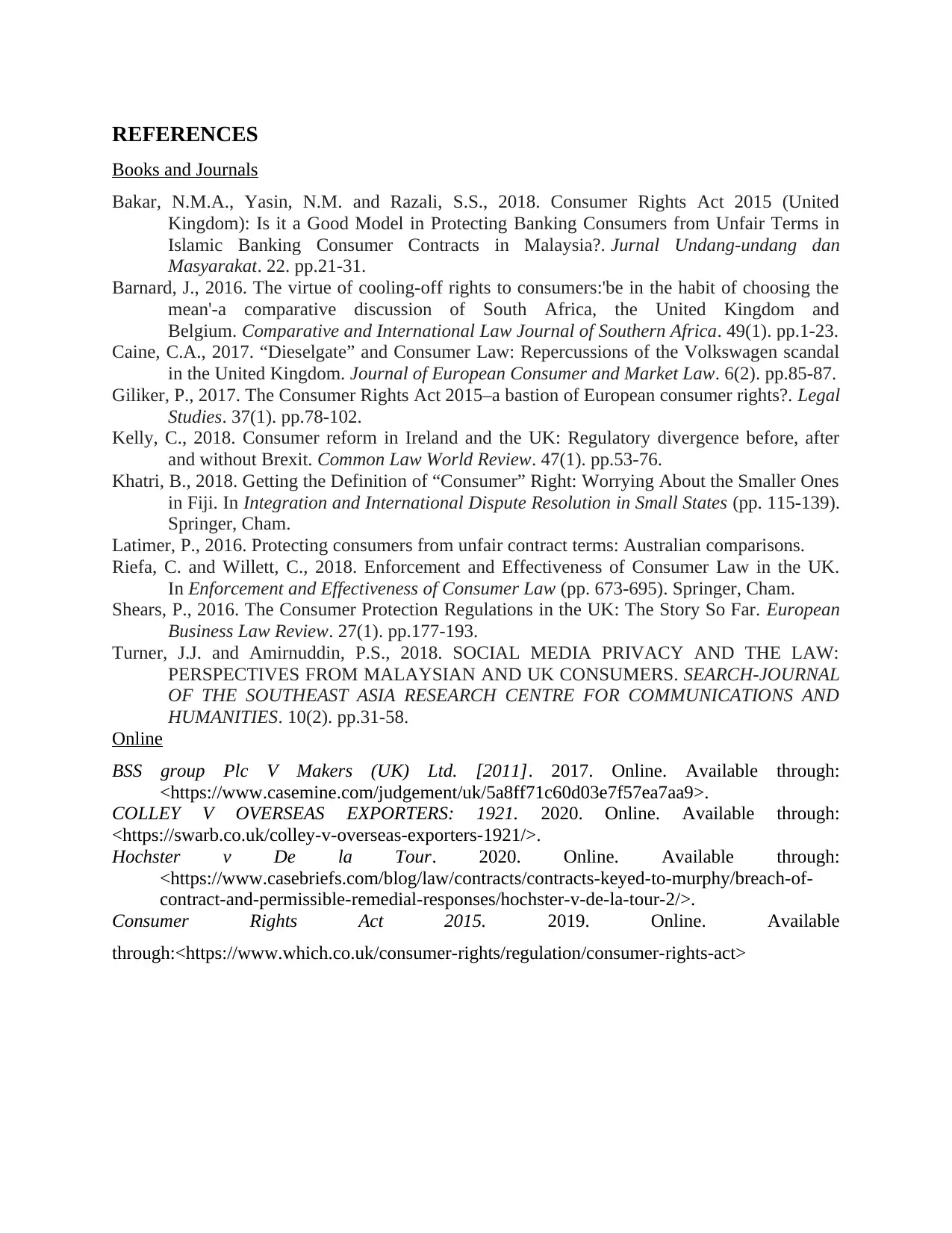
REFERENCES
Books and Journals
Bakar, N.M.A., Yasin, N.M. and Razali, S.S., 2018. Consumer Rights Act 2015 (United
Kingdom): Is it a Good Model in Protecting Banking Consumers from Unfair Terms in
Islamic Banking Consumer Contracts in Malaysia?. Jurnal Undang-undang dan
Masyarakat. 22. pp.21-31.
Barnard, J., 2016. The virtue of cooling-off rights to consumers:'be in the habit of choosing the
mean'-a comparative discussion of South Africa, the United Kingdom and
Belgium. Comparative and International Law Journal of Southern Africa. 49(1). pp.1-23.
Caine, C.A., 2017. “Dieselgate” and Consumer Law: Repercussions of the Volkswagen scandal
in the United Kingdom. Journal of European Consumer and Market Law. 6(2). pp.85-87.
Giliker, P., 2017. The Consumer Rights Act 2015–a bastion of European consumer rights?. Legal
Studies. 37(1). pp.78-102.
Kelly, C., 2018. Consumer reform in Ireland and the UK: Regulatory divergence before, after
and without Brexit. Common Law World Review. 47(1). pp.53-76.
Khatri, B., 2018. Getting the Definition of “Consumer” Right: Worrying About the Smaller Ones
in Fiji. In Integration and International Dispute Resolution in Small States (pp. 115-139).
Springer, Cham.
Latimer, P., 2016. Protecting consumers from unfair contract terms: Australian comparisons.
Riefa, C. and Willett, C., 2018. Enforcement and Effectiveness of Consumer Law in the UK.
In Enforcement and Effectiveness of Consumer Law (pp. 673-695). Springer, Cham.
Shears, P., 2016. The Consumer Protection Regulations in the UK: The Story So Far. European
Business Law Review. 27(1). pp.177-193.
Turner, J.J. and Amirnuddin, P.S., 2018. SOCIAL MEDIA PRIVACY AND THE LAW:
PERSPECTIVES FROM MALAYSIAN AND UK CONSUMERS. SEARCH-JOURNAL
OF THE SOUTHEAST ASIA RESEARCH CENTRE FOR COMMUNICATIONS AND
HUMANITIES. 10(2). pp.31-58.
Online
BSS group Plc V Makers (UK) Ltd. [2011]. 2017. Online. Available through:
<https://www.casemine.com/judgement/uk/5a8ff71c60d03e7f57ea7aa9>.
COLLEY V OVERSEAS EXPORTERS: 1921. 2020. Online. Available through:
<https://swarb.co.uk/colley-v-overseas-exporters-1921/>.
Hochster v De la Tour. 2020. Online. Available through:
<https://www.casebriefs.com/blog/law/contracts/contracts-keyed-to-murphy/breach-of-
contract-and-permissible-remedial-responses/hochster-v-de-la-tour-2/>.
Consumer Rights Act 2015. 2019. Online. Available
through:<https://www.which.co.uk/consumer-rights/regulation/consumer-rights-act>
Books and Journals
Bakar, N.M.A., Yasin, N.M. and Razali, S.S., 2018. Consumer Rights Act 2015 (United
Kingdom): Is it a Good Model in Protecting Banking Consumers from Unfair Terms in
Islamic Banking Consumer Contracts in Malaysia?. Jurnal Undang-undang dan
Masyarakat. 22. pp.21-31.
Barnard, J., 2016. The virtue of cooling-off rights to consumers:'be in the habit of choosing the
mean'-a comparative discussion of South Africa, the United Kingdom and
Belgium. Comparative and International Law Journal of Southern Africa. 49(1). pp.1-23.
Caine, C.A., 2017. “Dieselgate” and Consumer Law: Repercussions of the Volkswagen scandal
in the United Kingdom. Journal of European Consumer and Market Law. 6(2). pp.85-87.
Giliker, P., 2017. The Consumer Rights Act 2015–a bastion of European consumer rights?. Legal
Studies. 37(1). pp.78-102.
Kelly, C., 2018. Consumer reform in Ireland and the UK: Regulatory divergence before, after
and without Brexit. Common Law World Review. 47(1). pp.53-76.
Khatri, B., 2018. Getting the Definition of “Consumer” Right: Worrying About the Smaller Ones
in Fiji. In Integration and International Dispute Resolution in Small States (pp. 115-139).
Springer, Cham.
Latimer, P., 2016. Protecting consumers from unfair contract terms: Australian comparisons.
Riefa, C. and Willett, C., 2018. Enforcement and Effectiveness of Consumer Law in the UK.
In Enforcement and Effectiveness of Consumer Law (pp. 673-695). Springer, Cham.
Shears, P., 2016. The Consumer Protection Regulations in the UK: The Story So Far. European
Business Law Review. 27(1). pp.177-193.
Turner, J.J. and Amirnuddin, P.S., 2018. SOCIAL MEDIA PRIVACY AND THE LAW:
PERSPECTIVES FROM MALAYSIAN AND UK CONSUMERS. SEARCH-JOURNAL
OF THE SOUTHEAST ASIA RESEARCH CENTRE FOR COMMUNICATIONS AND
HUMANITIES. 10(2). pp.31-58.
Online
BSS group Plc V Makers (UK) Ltd. [2011]. 2017. Online. Available through:
<https://www.casemine.com/judgement/uk/5a8ff71c60d03e7f57ea7aa9>.
COLLEY V OVERSEAS EXPORTERS: 1921. 2020. Online. Available through:
<https://swarb.co.uk/colley-v-overseas-exporters-1921/>.
Hochster v De la Tour. 2020. Online. Available through:
<https://www.casebriefs.com/blog/law/contracts/contracts-keyed-to-murphy/breach-of-
contract-and-permissible-remedial-responses/hochster-v-de-la-tour-2/>.
Consumer Rights Act 2015. 2019. Online. Available
through:<https://www.which.co.uk/consumer-rights/regulation/consumer-rights-act>
1 out of 8
Related Documents
Your All-in-One AI-Powered Toolkit for Academic Success.
+13062052269
info@desklib.com
Available 24*7 on WhatsApp / Email
![[object Object]](/_next/static/media/star-bottom.7253800d.svg)
Unlock your academic potential
© 2024 | Zucol Services PVT LTD | All rights reserved.





